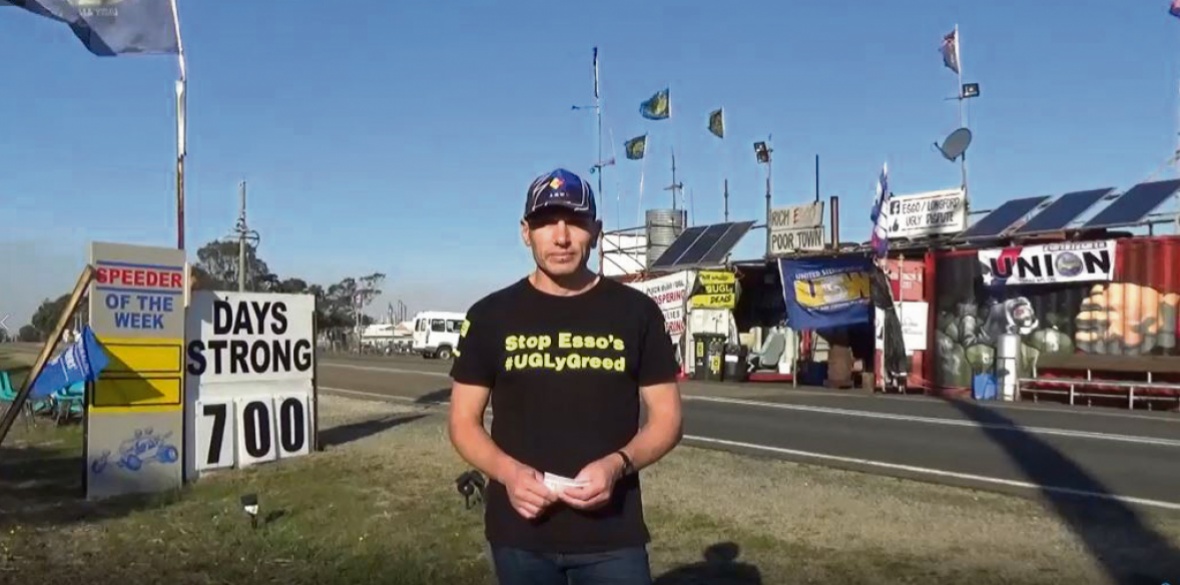This is the last article you can read this month
You can read more article this month
You can read more articles this month
Sorry your limit is up for this month
Reset on:
Please help support the Morning Star by subscribing here
AT 3am on June 22 2017 I never gave it a thought that I’d be standing up in front of people talking about my life and what would happen over the next 700 days.
I never thought that I’d be visiting members of Parliament to discuss loopholes that allowed an entire maintenance workforce to be made redundant one day and reoffered their job back the next.
I never imagined I’d be invited to Geneva to talk about issues related to tax or sit in a senate inquiry listening to a man (who I essentially worked for) admitting the sixth-biggest company in the world has not paid any corporation tax in Australia for four years, despite making $33.1 billion.
I never imagined that my personal life would be so challenging, that I would end up hurting the people I love most because of the things that lay ahead.
Yet I am not the only one who suffers such thoughts as these.
Because on that day 700 days ago we were several members and their union organisers, waking up early to take the first few steps in a fight that would last longer than any other fight in the past 40 years, to stand up to the deplorable tactics of both Exxon Mobil and UGL/Cimic.
The Exxon/UGL dispute picket line began on June 22 2017 and has been manned continuously ever since, 24 hours per day, seven days per week.
It began not as a quest for a small increase in pay, or a few extra conditions added to a workplace agreement but because, 3,500 kilometres away, five people signed an agreement that cut 40 per cent of the workers’ wages on a worksite they were not working, overnight.
It stripped away conditions that had been won through hard but fair negotiations over the past 40 years. And took away every single full-time job.
But that was not all. The agreement also introduced a stand-down clause that could see workers sent to work on remote oil or gas platforms but stood down without pay at the discretion of the company.
Away from home, away from family, yet stood down without pay because the facility operator could not issue a work permit, due to something they had themselves done wrong.
I know it sounds outrageous. But it is 100 per cent true. It is also 100 per cent legal in Australia.
Anyone who wants a good future for themselves, their families or their children needs to take notice of what is happening right now in Australia.
Good, honest, hardworking men and women are having their rights at work stripped away and receiving wage cuts in return.
The right to earn a living wage is becoming less and less evident. Yet the right to speak out against unethical or immoral attacks on workers is seemingly becoming harder and harder to do.
Meanwhile, families are being burdened by huge debts as the cost of living increases, yet the wage pool is getting smaller.
And workers are being forced to compete against each other as full-time jobs are lost to casualisation.
In October last year, I was invited to Geneva by Cictar (the Centre for International Corporate Tax Accountability and Research), the Tax Justice Network and Public Services International to raise awareness of Exxon Mobil and UGL/Cimic’s corporate tax avoidance.
At the same time, I brought attention to the other 731 companies in Australia who also earned over $100 million in revenue but did not pay tax.
The question was asked, what would it mean to Australia should all these companies pay their fair share of tax like we the workers do?
Thankfully, the Australian Manufacturing Workers Union had already put some calculations together. The results were staggering.
Had Exxon Mobil alone paid its fair share of tax, we could have employed an astounding 16,415 nurses, 21,496 teachers or 37,307 apprentices (based on the years 2014 to 2017 only).
Imagine what we could do should the other 731 companies pay their fair share of tax also?
However, despite the obvious gains to society, the people in Australia are continually being led to believe that wages are too high — even though income inequality is greater than it has ever been during the past 76 years.
We’ve certainly come a long way over the past 700 days, but we still have a long, long way to go.
What started as a small dispute in Longford, Victoria, to win back our jobs, has now become a fight to defend the rights of workers everywhere.
It is no longer just a fight for our own families, but a fight for all families. A fight for all those who come behind us and a fight for those who have gone before us.
It’s a fight to show that we are willing to do whatever it takes to see righteousness and justice served.
And we will continue to stand up and fight back, with the support of unions such as Unite, the United Steelworkers, Workers Uniting and IndustriALL to ensure we remain what we are today, and that is the trade union of Australia and the world.
Troy Carter is the lead delegate for the Australian Manufacturing Workers Union (AMWU) Exxon/UGL dispute and Longford in Australia.












